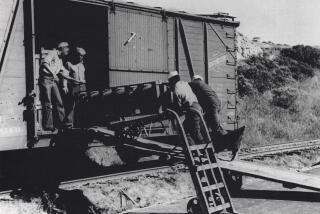‘I think that the public does not realize what these people have gone through.’ : Civilian WWII POWs Praised at Reunion
A U.S. Department of Labor official Saturday praised almost 300 former civilian prisoners of World War II for organizing to deal with lingering traumas and urged them to seek benefits that the U.S. government may owe them.
G. B. Prince Jr., deputy assistant secretary of labor for veterans’ employment and training, said the former civilian POWs have neglected their rights and benefits for too long.
“I think that their coming together finally, after more than 40 years, is very encouraging. I hope that they will continue to meet and to organize for their benefit,” Prince said at the First National Former Civilian Internee Conference at the Holiday Inn in Fullerton.
Most of those at the conference were American civilians held in prison camps for more than three years after the Japanese overran the Philippine archipelago in late 1941 and early 1942.
Benefits, Medical Care
Prince said many of them failed to take advantage of benefits and medical care for which they are eligible under the War Claims Act of 1948. Prince said Congress may need to look at the act again for possible revisions.
“I think that the public does not realize what these people have gone through,” he said. “They have problems that need to be made public, so they may get the necessary help.”
The former internees also heard from doctors and psychologists about lingering effects that the years of imprisonment and near starvation may have had on them.
Dr. Clarence Carnahan, who has interviewed and examined many former POWs for the Veterans Administration, said many have difficulty shaking the trauma of their incarceration.
“What we see in many of these people is that they have residual effects from their experience,” Carnahan said. “At times, they are still acting or feeling as if they were present in the prison camp.”
An impromptu show of hands revealed that many of the former internees have those feelings but have never sought treatment.
The three-day conference also offered a chance for reunions. Throughout the day, people who had not seen each other for 40 years embraced and told about their lives since the war.
‘God Bless Them!’
They also watched film clips of their rescue by the 11th Airborne Division and the 1st Cavalry Division.
“God bless them!” said Patricia M. Remley, who was held prisoner for more than three years in temporary detention facilities at Santo Tomas University in Manila.
Dr. Dana Nance, who was a civilian doctor at the Los Banos prison camp 30 miles south of Manila, also received applause when he spoke to his former patients and fellow ex-prisoners. Now 82, Nance is retired and resides in Guadalajara, Mexico.
“For me, personally, I have forgotten some of the rough spots of internment,” he said. “But I can say with satisfaction that I was glad to be needed. In a prison camp, a doctor is a must. And I look back at that time with a great deal of nostalgia.”
More to Read
Sign up for Essential California
The most important California stories and recommendations in your inbox every morning.
You may occasionally receive promotional content from the Los Angeles Times.










